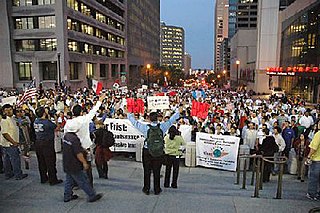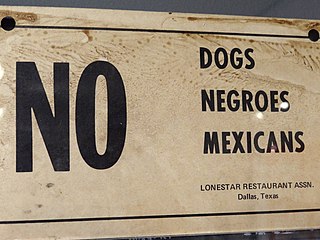Related Research Articles

Mexican Americans are Americans of Mexican heritage. In 2019, Mexican Americans comprised 11.3% of the US population and 61.5% of all Latino Americans. In 2019, 71% of Mexican Americans were born in the United States, though they make up 53% of the total population of foreign-born Latino Americans and 25% of the total foreign-born population. The United States is home to the second-largest Mexican community in the world, second only to Mexico itself. Most Mexican Americans reside in the Southwest. Many Mexican Americans living in the United States have assimilated into American culture which has made some become less connected with their culture of birth and sometimes creates an identity crisis.

California Proposition 187 was a 1994 ballot initiative to establish a state-run citizenship screening system and prohibit illegal immigrants from using non-emergency health care, public education, and other services in the State of California. Voters passed the proposed law at a referendum on November 8, 1994. The law was challenged in a legal suit the day after its passage, and found unconstitutional by a federal district court on November 11. In 1999, Governor Gray Davis halted state appeals of this ruling.

The Immigration Reform and Control Act was passed by the 99th United States Congress and signed into law by U.S. President Ronald Reagan on November 6, 1986.

Hispanic and Latino Americans are Americans of full or partial Spanish, and/or Latin American ancestry. More broadly, these demographics include all Americans who identify as Hispanic or Latino regardless of ancestry. As of 2020, the Census Bureau estimated that there were almost 65.3 million Hispanics and Latinos living in the United States and Puerto Rico.

Proposition 200, the "Arizona Taxpayer and Citizen Protection Act", was an Arizona state initiative passed in 2004 that basically requires: (a) persons to provide proof of citizenship to register to vote; (b) voters to present a photo identification before receiving a ballot at the polling place; and (c) state and local agencies to verify the identity and eligibility, based on immigration status, of applicants for non-federally mandated public benefits. The proposition also makes it a misdemeanor for public officials to fail to report violations of U.S. immigration law by applicants for those public benefits and permits private lawsuits by any resident to enforce its provisions related to public benefits. The requirement to provide proof of citizenship to register to vote was later ruled invalid in federal court.
Immigration reduction refers to a social movement in the United States that advocates a reduction in the amount of immigration allowed into the country. Steps advocated for reducing the numbers of immigrants include advocating stronger action to prevent illegal entry and illegal immigration, and reductions in non-immigrant temporary work visas. Some advocate tightening the requirements for legal immigration requirements to reduce numbers, or move the proportions of legal immigrants away from those on family reunification programs to skills-based criteria. What separates it from standard immigration reform is that reductionists see immigration as a major source of social, economic, and environmental problems, and seek to curtail current immigration levels.

The Federation for American Immigration Reform (FAIR) is a non profit, anti-immigration organization in the United States. The group publishes position papers, organizes events, and runs campaigns in order to advocate for changes in U.S. immigration policy. The Southern Poverty Law Center classifies FAIR as a hate group with close ties to white supremacist groups.

The Minuteman Project is an organization which was founded in the United States in August 2004 by a group of private individuals who sought to extrajudicially monitor the United States–Mexico border's flow of illegal immigrants. Founded by Jim Gilchrist and Chris Simcox, the organization's name is derived from the name of the Minutemen, militiamen who fought in the American Revolution. The Minuteman Project describes itself as "a citizens' Neighborhood Watch on our border", and it has attracted the attention of the media due to its focus on the issue of illegal immigration.
The Border Protection, Anti-terrorism, and Illegal Immigration Control Act of 2005 was a bill in the 109th United States Congress. It was passed by the United States House of Representatives on December 16, 2005, by a vote of 239 to 182, but did not pass the Senate. It was also known as the "Sensenbrenner Bill," for its sponsor in the House of Representatives, Wisconsin Republican Jim Sensenbrenner. The bill was the catalyst for the 2006 U.S. immigration reform protests and was the first piece of legislation passed by a house of Congress in the United States illegal immigration debate. Development and the effect of the bill was featured in "The Senate Speaks", Story 11 in How Democracy Works Now: Twelve Stories a documentary series from filmmaking team Shari Robertson and Michael Camerini.

In 2006–2007, millions of people participated in protests over a proposed change to U.S. immigration policy. These large scale mobilizations are widely seen as a historic turn point in Latino politics, especially Latino immigrant civic participation and political influence, as noted in a range of scholarly publications in this field. The protests began in response to proposed legislation known as H.R. 4437, which would raise penalties for illegal immigration and classify illegal aliens and anyone who helped them enter or remain in the US as felons. As part of the wider immigration debate, most of the protests not only sought a rejection of this bill, but also a comprehensive reform of the country's immigration laws that included a path to citizenship for all illegal immigrants.

"Sí, se puede" is the motto of the United Farm Workers of America, and has since been taken up by other activist groups. In 1972, during César Chávez's 25-day fast in Phoenix, Arizona, UFW's co-founder, Dolores Huerta, came up with the slogan. "Sí se puede" has long been a UFW guiding principle that has served to inspire accomplishment of goals. The phrase is a federally registered trademark of the UFW.

The Great American Boycott, also called the Day Without an Immigrant, was a one-day boycott of United States schools and businesses by immigrants in the United States which took place on May 1, 2006.

Illegal immigration to the United States is the process of migrating into the United States in violation of federal immigration laws. This can include foreign nationals (aliens) who have entered the United States unlawfully, as well as those who lawfully entered but then remained after the expiration of their visas, parole, TPS, etc. Illegal immigration has been a matter of intense debate in the United States since the 1980s.

California Coalition for Immigration Reform (CCIR) was a Huntington Beach, California-based political advocacy group devoted to immigration reduction, with an emphasis on combating illegal immigration to the United States. According to the organization's website, its objectives were to "promote and expand citizen and legal resident awareness by a practical, effective communication network" and to "mobilize citizens and legal residents to support elected representatives and legislation" who favor immigration reduction.

Anti-Mexican sentiment is an attitude toward people of Mexican descent, Mexican culture and/or Mexican Spanish and is most commonly found in the United States.
Hispanophobia or anti-Spanish sentiment is a fear, distrust, hatred of; aversion to, or discrimination against the Spanish language, Hispanic, Latino and/or Spanish people, and/or Hispanic culture. The historical phenomenon has gone through three main stages by originating in 16th-century Europe, reawakening during 19th-century disputes over Spanish and Mexican territory such as the Spanish–American War and the Mexican–American War, and continuing to exist to the present day in tandem with politically-charged controversies such as bilingual education and illegal immigration to the United States.

Russell K. Pearce is an American far-right politician and Republican (GOP) former member of the Arizona State Senate. He rose to national prominence as the primary sponsor of Arizona SB1070, a controversial anti-illegal immigrant measure that was signed into law in 2010. He was elected President of the Arizona Senate when the Senate began its January 2011 term but then suffered a dramatic reversal of fortune when he was ousted in a November 2011 recall election, the first legislator in Arizona history to be so removed from office. He served as Vice-Chair of the Arizona GOP, but he resigned the position in September 2014 after controversy over a eugenicist comment about forced sterilization of poor women on Medicaid.

The city of Houston has significant populations of Mexican Americans, Mexican immigrants, and Mexican citizen expatriates. Houston residents of Mexican origin make up the oldest Hispanic ethnic group in Houston, and Jessi Elana Aaron and José Esteban Hernández, authors of "Quantitative evidence for contact-induced accommodation: Shifts in /s/ reduction patterns in Salvadoran Spanish in Houston," referring to another large Latino group in Houston, stated that as of 2007 it was the most "well-established" Hispanophone ethnic group there. Houston is the third city for Mexican immigrants after Chicago and Los Angeles.

The City of Houston includes a significant population of Central American origin due to Texas’ proximity to Central America, including origins from El Salvador, Guatemala, Honduras, and other countries.
Georgia House Bill 87 is an anti-illegal immigration act passed by the Georgia General Assembly on April 14, 2011, and signed into law by Georgia governor Nathan Deal on May 13, 2011. It took effect on July 1 of that year. The law was authored by Peachtree City Republican state representative Matt Ramsey, and was partly based on Arizona's SB 1070 bill that had passed the previous year.
References
- ↑ Kenny, Karen Latchana (2010). Illegal Immigration. ABDO Publishing. p. 40. ISBN 9781617852596 . Retrieved 18 July 2019.
- ↑ Brennan, Georgina (5 July 2006). "House, Senate Border Hearings Begin". Irish Voice.
- ↑ You Don’t Speak for Me! Legal Mexican Immigrants Outraged Over Amnesty for Illegals, Standing Up Against Illegal Immigration
- ↑ Orchowski, Margaret Sands (2008). Immigration and the American Dream: Battling the Political Hype and Hysteria . Rowman & Littlefield. p. 123. ISBN 9780742558748.
- ↑ Fischer, Howard (24 March 2007). "Employers, entrants targeted in 2 initiatives". Arizona Daily Star.
- ↑ Uranga, Rachel (20 July 2006). "Survey: Latinos are more unified". Daily Democrat. Retrieved 11 July 2019.
- ↑ Cepeda, Esther (11 February 2007). "Chicago Latino trying to fight illegal immigration: 'There are a lot of Hispanics out there like me'". Chicago Sun - Times.
- ↑ Page, Clarence (6 June 2016). "One man's 'amnesty' is another's 'disaster'". The Baltimore Sun.
- ↑ You Don't Speak for Me
- ↑ Robinson, Greg; Chang, Robert S. (2016). Minority Relations: Intergroup Conflict and Cooperation. University of Mississippi Press. ISBN 978-1496810465 . Retrieved 18 July 2019.
- ↑ 2006 FAIR Annual Report
- ↑ Kalita, S. Mitra (11 May 2006). "Dissonant Voices Inside the Border; Some Established Immigrants Want to Restrict Newcomers". The Washington Post.
- ↑ Pangonis, Dustin (22 March 2009). "Hispanic-Americans set to speak at anti-illegal immigration rally". Republican Herald.
- ↑ Coln, Vanessa (2 May 2007). "Demonstrators seek reform Crowds in Fresno and Visalia are smaller than last year, but hope for immigration change still strong". FresnoBee.
- ↑ Feeney, Michael (29 July 2007). "Heated debate on hot button issue ; Illegal immigration rally draws both sides". Bergen County Record.
- ↑ Packberg, Zach (19 October 2007). "Immigration rally gets approval after all". Asbury Park Press.
- ↑ McGee, Patrick (22 October 2007). "Anti-immigration Hispanics speak out". McClatchy.
- ↑ Llorente, Elizabeth (7 November 2007). "500 petition for police to crack down on illegals". The Record (Bergen County).
- ↑ Pitzl, Mary (28 March 2007). "PETITIONS TARGET IMMIGRATION: GROUP SEEKS TOUGHER ARIZONA LAWS AGAINST ILLEGAL MIGRANTS". Arizona Republic.
- ↑ Analysts: Tough political road for immigration reform North County Times – North San Diego and Southwest Riverside County News
- ↑ Fisher, Howard (23 March 2007). "Punishment for employers who hire illegals may go to voters". Arizona Sun. Retrieved 15 July 2019.